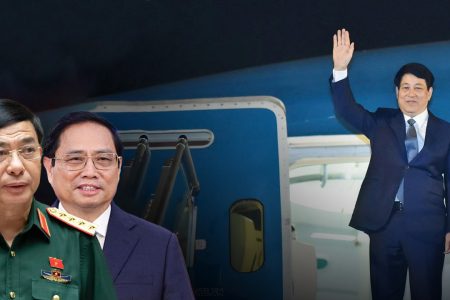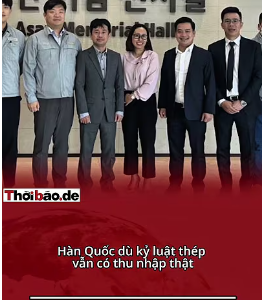
Israel is the second biggest arms supplier to Vietnam, after Russia, in 2019, according to the Stockholm International Peace Research Institute (SIPRI). In addition to military cooperation, Israel is also one of the few countries that transfer technology for modern weapon productions to Vietnam, for example, the Galil ACE 31/32 infantry gun production line at Factory Z-111 in Vietnam’s General Department of Defense Industry.
According to Vietnam’s state-controlled media, this is an opportunity for Vietnam to „take a shortcut“ to master defense equipment technology because not all countries are willing like Israel to share it with strategic partners. While many Western countries are cautious about supplying weapons to Vietnam because of the „red line“ set up by the US, Israel knows how to choose weapons that are moderately relevant to US source technologies. to transfer.
The Marine Corps (Marines) of the Vietnam People’s Navy uses the most Israeli weapons. The Vietnam-Israel military equipment contract focuses mainly on three forms: purchasing an entire system (1), buying equipment for a system (2), and transferring technology (3).
To better understand the Vietnam-Israel defense partnership, RFI Vietnamese asked researcher Benoît de Tréglodé, a Vietnam expert, director of Africa – Asia – Middle East region, Institute of Strategy Research of the French Military School (IRSEM).
*****
RFI: How and when did Vietnam change its view to establishing relations with Israel, while Hanoi supported Palestine for a long time?
Benoît de Tréglodé: First of all, it must be said that Vietnam and Israel established diplomatic relations before both the relationship between Hanoi and Washington, as early as 1993 when Vietnam implemented the open-door policy. In that context, many agreements were quickly signed by Hanoi with Israel but focused mainly on trade, economy, and agriculture. Thereafter, the relationship between the two countries was still mainly economic and then expanded into the political realm in the 2000s.
In 2005, the Foreign Ministries of the two countries had their first political dialogue, then quickly focused on defense issues in 2010. This is an interesting point to understand what’s going on right now between Israel and Vietnam. A memorandum on defense was signed by the two sides in 2015. By 2018, the two countries held a defense dialogue and now, Israel becomes the true military partner of Vietnam, only after Russia.
If we turn the history of relations between Vietnam, Israel, and Palestine, there is a close tradition between the Vietnamese Communist Party and the ideal of Palestine in the international left-wing. But in the 1990s, pragmatism and real politics motivated Vietnam to establish relations with Israel, above all for economic reasons. Back in 1946, when Ho Chi Minh arrived in Paris, it seemed that he was staying in the same hotel as Ben Gourion, the later founder of the State of Israel, in 1948. It was repeated in the 1990s that two leaders at that time were very compatible. Therefore, for Vietnam, there is no contradiction in both friendly relations with Palestine and maintaining dialogue with Israel.
RFI: Hanoi and Washington normalize relations, followed by the US to lift sanctions on Vietnam. What role do these events play in the relationship between Israel and Vietnam?
Benoît de Tréglodé: The US lifted Vietnam’s trade embargo in 1994 and the two countries normalized relations in 1995. At that time, defense relations between Vietnam and Israel were almost non-existent. In my opinion, that is not one of the top reasons.
The problem has been different since Washington lifted its arms ban on Hanoi in 2016. At the time, a triangular relationship formed between Israel’s major arms suppliers, these companies‘ relationships with US corporations, and their ability to export to Vietnam sensitive equipment.
RFI: Israel is Vietnam’s second arms supplier, only after Russia, in 2019. Why does Vietnam choose Israel over some other countries? What are the strengths of Israel’s technology and defense industry to attract Vietnam?
Benoît de Tréglodé: The new point can be summed up in one topic, the rise of electronic warfare. Currently, the People’s Army of Vietnam needs first of all three types of equipment in the areas of cybersecurity, drones, and related to the transfer of sensitive intelligence and aerial technology. All three areas are quite sensitive.
Since the Russian defense industry has been embargoed on the world for several years now, it partly limits the traditionally strong relationship between Russia and Vietnam in terms of arms exchanges. To be clear, Vietnam is no longer buying Russian equipment that actually meets their needs. Another point, also very important, is that Hanoi is wary of the strong ties between the Russian army and defense industry groups with Chinese partners from 2014-2015.
In this, both geopolitical and industrial context, the proposed items from Israeli weapons manufacturers match the needs of Vietnam. It can be seen that since 2016, Hanoi ordered a lot of Israeli equipment, mainly related to drones, artillery, observation systems, radar, missiles, etc. It can be said that all that Israel’s major industrial groups offer for sale meet strategic needs, in terms of the reorganization of conflicting relationships, as well as in terms of war in the field. Currently, electronic warfare requires equipment that Israel can supply in Vietnam.
RFI: Going back to the case of Turkey, a NATO member state, buying Russia’s S-400 missile defense system. Is the US concerned about a similar situation with Vietnam?
Benoît de Tréglodé: Since the US lifted its arms sales embargo on Vietnam in 2016, we see that these two countries have no major contract to supply equipment. This can be explained for two reasons.
First, for Hanoi, in terms of geopolitics and politics, it is very difficult for neighboring countries, especially China, to accept Vietnam’s purchase of extremely sensitive defensive weapons from the US. This is one of the explanatory factors for Israel’s success from the past few years because buying Israeli military equipment, if you look at the geopolitical front, causes less trouble for the Vietnamese military.
The second is due to recent concerns of the US side. They fear that the export to Vietnam of sensitive military equipment is not necessarily safe and could lead to uncontrolled exchanges with Russia and China, the two countries that currently have many large disagreements with the US.
These reasons explain why, in the last few years, Israel has become Vietnam’s second-largest defense partner.
RFI: Israel also accepts technology transfer of some products to Vietnam, for example, a rifle production line at the Z-111 factory. Will it be a „win-win„?
Benoît de Tréglodé: The technology transfer side is one of the three pillars that maintain the defense relationship between Israel and Hanoi. It is true that European industrialists, as well as the US, are more restrictive in this regard. They have a wide range of systems and criteria related to anti-corruption, protection of sensitive equipment, components protected by export structures, etc. These points exist less often on the Israeli side and this is the case surely creating favorable conditions for the two countries to come together.
For example, Viettel Telecom Corporation of the Vietnamese army has decided to develop a home-grown drone program for several years, including drones and self-propelled armed airplanes. Meanwhile, Israel is famous for this area. The most recent evidence is the conflict in Upper Karabakh, the Azerbaidjan army is equipped with a series of extremely modern drones of Israel. This makes the difference and helps the Azerbaidjan army to defeat the Armenian armed forces.
It should be remembered that in principle, the Russian defense industry does not export drones. This is the second point that explains Israel and Vietnam thanks to supply and demand and pushes Hanoi to strengthen its technology and industrial partnership with Israel.
In addition, another point needs to be raised due to some problem in the defense relationship between the two countries. Several sources reported directly to State Secretary-General Nguyen Phu Trong about huge commissions on arms sales contracts between Israel and Vietnam and involving many people in the leadership circles, including in the Ministry of Defense of Vietnam. An investigation has been opened.
Some technology transfer projects are currently suspended as the Party Congress approaches but have yet to restart, as there is a huge dispute, even though the Congress is over. Vietnam is negotiating to buy a military surveillance satellite. There is a very strong confrontation between the Israeli and US producers in this regard. This could be the source of a fierce industrial war and could have serious political consequences for Vietnam’s defense.
It is in this context that it is important to reassess the bilateral relationship because it emphasizes the cooperative relationship at a time when the US has not yet actually exported its military equipment to Vietnam. Currently, Washington has many ambitions for Vietnam, and the Israeli industrialists will also have a big competitor. This transcends the grand strategic diplomatic framework that defines Hanoi’s relations with traditional allies Russia and China. This also needs to be understood in the sense of conflict and strategic competition among arms sellers in many countries. All are not necessarily diplomatic but very harsh on the commercial side.
RFI Vietnamese would like to thank researcher Benoît de Tréglodé, director of Africa – Asia – Middle East region, and the French Military School’s Strategic Research Institute (IRSEM).
*****
(1) SPYDER air defense missile system; radar complex of sight-seeing circle ELM-2288ER and ELM-2022; some types of guns from Israel Military Industries (IMI), Tavor assault rifles, Matador anti-tank guns, advanced jet artillery systems such as Extra, Accular; Heron 1 MALE drone and a ground checkpoint …
(2) Vietnam’s marine reconnaissance and patrol aircraft are also equipped with modern Israeli reconnaissance equipment …
(3) Transferred synchronously from the A-Z the advanced infantry gun production line Galil ACE 31/32 at the Z111 factory under the General Department of Defense Industry. This production line has enabled Vietnam to self-produce many lines of „Made in Vietnam“ guns to adapt to Vietnam’s needs: production of AK submachine guns, PKMS machine guns, and 12.7 mm heavy sniper rifles. In addition, Vietnam self-introduced the first two models of real assault rifles „Made in Vietnam“ named GK1 and GK3, based on the combination of the advantages of the two lines Galil ACE and AK; transfer technology to upgrade T-54/55 tanks and some armored vehicles …
Thoibao.de (Translated)


























